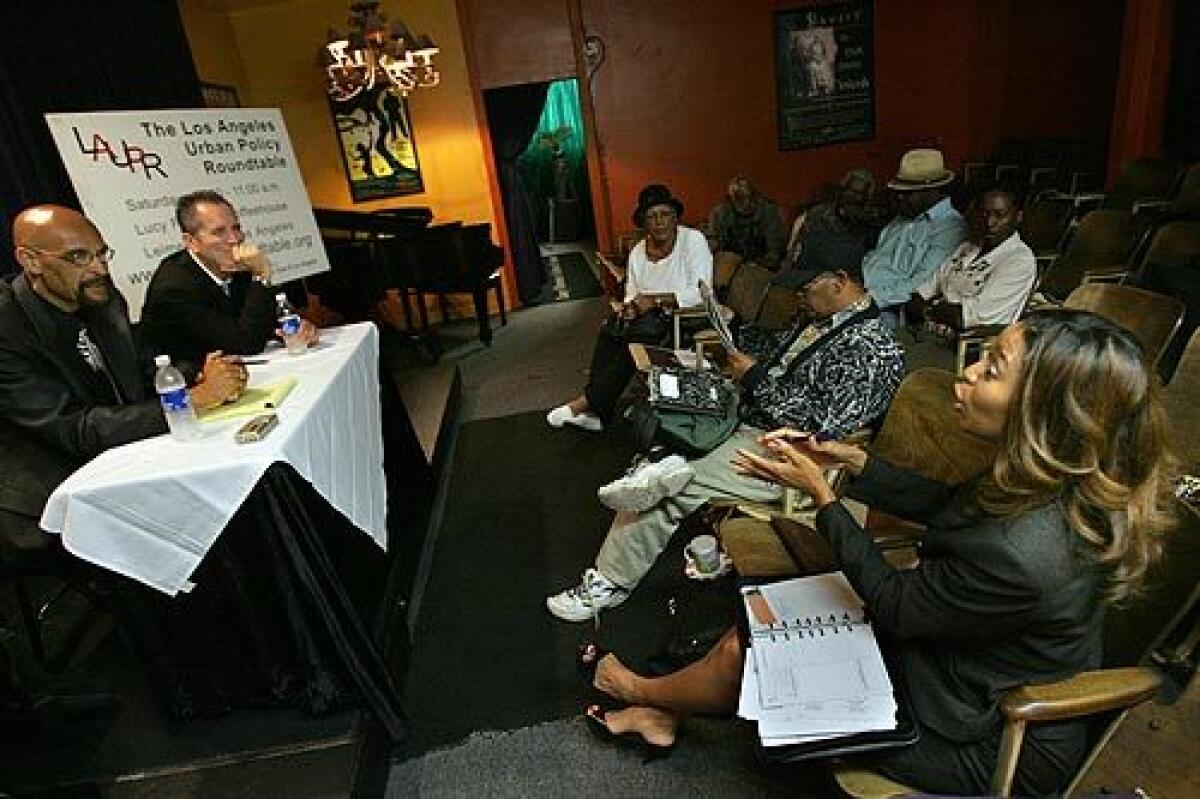Inglewood police oversight commission members are frustrated

- Share via
Adrianne Sears said she felt powerless and frustrated last summer when Inglewood residents angrily demanded to know why police in the span of four months had fatally shot four men -- three of whom were unarmed.
As chairwoman of the Citizen Police Oversight Commission, residents expected that she and other commissioners would have answers. But they had none.
“We should have been in the know, and, of course, we weren’t,” Sears said.
The spate of shootings exposed Sears’ 11-member oversight panel as a “toothless” body, she said, with few powers to effectively oversee the force.
As the U.S. Department of Justice last week announced an investigation into the Inglewood Police Department -- marking the second ongoing review of the agency -- Sears said she hoped that future changes would also mean a transformed commission.
Residents “wanted a civilian review board that was able to review not only citizen complaints, but obviously more serious issues,” she said.
The civilian oversight panel was created in 2002 in the aftermath of a controversial arrest in which an Inglewood officer was captured on videotape punching a handcuffed 16-year-old boy and slamming him onto the hood of a squad car. The incident was broadcast nationally and sparked protests among residents who complained that Inglewood police were heavy-handed and racist.
Broad powers
In response, city leaders passed an ordinance establishing the oversight board and giving it broad powers. The commission had the authority to hold hearings on officer misconduct, subpoena witnesses and weigh in on possible officer punishment.
It seemed as if Inglewood leaders were embracing a growing national trend in law enforcement of giving citizens substantive oversight roles in police disciplinary matters. But that early promise, community advocates say, was short-lived.
By the time commission members were sworn in and held their first meeting, the City Council -- bowing in part to pressure from the police union -- had significantly amended the original ordinance, stripping the panel of most of its powers, according to Assemblyman Curren Price (D-Inglewood), who was a councilman in Inglewood at the time.
As a result, the panel has had little effect on police matters and the way officers conduct themselves in the department. They are not given most internal records and have a distant relationship with Police Chief Jacqueline Seabrooks, who said that because of how the ordinance is written, she is sometimes able to give more information to the public than to the commission.
‘Figurehead’
One commissioner, Don Nicholson, started skipping meetings because he was so frustrated with feeling ineffective and what he called the city’s “disrespect” for the community.
“They set this commission up intentionally not to have any power and just to be a figurehead,” he said.
The commission’s inability to oversee the department was glaringly exposed after the series of shootings last year.
Frustrated by a lack of information about the shootings from Seabrooks and City Hall, residents turned to Sears and her colleagues. The panel, however, had been kept in the dark as well.
Some City Council members have said they would like to see the commission’s role expanded to imitate other watchdog groups in the Southland with more authority, but nearly a year after the first shooting there has been little progress and there are few indications that city officials are going to radically reform the group.
Officer Greg Held, former president of the Inglewood Police Assn., said last year that the union would like to see the commission act only as an advisory board and that the union would oppose any expansion of the commission’s powers.
He said police commissions with too much authority are dangerous because they have “knee-jerk” reactions to incidents and can act at “fast-food speeds.”
Some community activists said they were pleased that the Justice Department had opened a “pattern or practice” investigation, which is being handled by the agency’s civil rights division in Washington, D.C., and is supposed to ensure proper management and oversight.
In addition to the federal investigation, the Los Angeles County Office of Independent Review, which monitors the Sheriff’s Department, was invited by Seabrooks to investigate her department amid calls for state and federal probes.
Mike Gennaco, head of the review agency, said he hoped to have his first set of recommendations ready by mid-April and that some of his suggestions would include possible changes to the commission and better ways the department can communicate with residents, especially after crises.
But whether the council and Police Department would embrace any recommendations is unclear. And in the meantime, the commission remains largely out of the loop.
Last week, commission members were not briefed by the department about the federal probe.
At least two members said they learned of the development not from the chief, but from a reporter.
“I volunteered for this position,” Nicholson said, “but I sometimes feel the only reason the commission exists is so the city can say there is one.”
More to Read
Sign up for Essential California
The most important California stories and recommendations in your inbox every morning.
You may occasionally receive promotional content from the Los Angeles Times.










